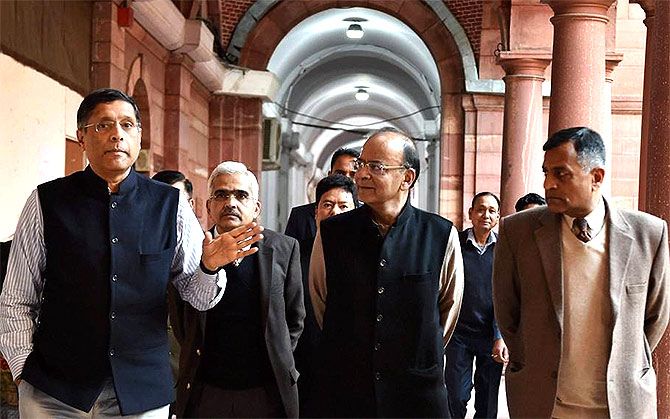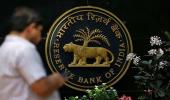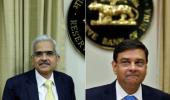'The macro-economic stresses -- high interest rates, rupee depreciation and capital flows -- have receded now.'
'Interest rates have come down, inflation is down and the rupee has bounced back.'
'If oil prices continue at this level, there will be no vulnerability.'
'Growth is a different story.'

"Independence of the RBI is very important. But that does not mean they can't be criticised," Dr Arvind Subramanian, former chief aconomic advisor and professor at the Harvard Kennedy School, tells Advait Rao Palepu and Abhijit Lele.
You have said in your new book (Of Counsel: The Challenges of the Modi-Jaitley Economy, Penguin) that demonetisation was a draconian policy. Was it an instance of post-truth policy, given there was no justification for it? The outcomes are also inexact, to say the least
In my book, I propose two puzzles.
I don't think it's a strictly post-truth puzzle, as it is part of a much larger phenomenon.
The first puzzle: In the US, people ask why white men vote for President Donald Trump, even though they need the welfare state while he is dismantling it.
Why do people act apparently against their self-interest?
This is a profound psychological politico-economy question.
I have a controversial hypothesis on this: Large costs inflicted on the economy were a feature of demonetisation, not a bug in the policy.
Maybe it was intrinsic to the political success of demonetisation.
The second puzzle is why even with 86 per cent of the currency demonetised there was hardly any impact on gross domestic product.
Growth did slow down, but there was also the effect of the goods and services tax.
So it's difficult to know how much exactly the effect of the note ban was.
I met Paul Krugman and Kenneth Roggoff in 2016, and both agreed that if you withdraw 86 per cent of the currency, GDP will collapse.
But, in India, it did not.
We still have a lot to learn about the Indian economy and politics, how cash works, the informal economy's resistance to policies, and if we are yet to see the full impact, which could be a measurement issue.
We have to question the disconnect between 'severe', 'draconian' or 'bold' policies.
The latest GDP numbers for Q2 of FY19 show a slight slowdown from Q1. Have we entered a low-inflation and low-growth cycle?
The macro-economic stresses -- high interest rates, rupee depreciation and capital flows -- have receded now.
Interest rates have come down, inflation is down and the rupee has bounced back.
If oil prices continue at this level, there will be no vulnerability.
Growth is a different story for several reasons.
Financial tightness will affect consumption.
Till now, bank credit was being offset by NBFC credit.
But now, even that is being affected.
The international environment is not that conducive as well.
Growth is slowing.
With trade war fears (between the US and China), we will have to navigate all of this carefully.
The European Union has slowed down, so have China and Japan.
Consumption and exports will be challenged.
Investment will depend on how we address the twin balance sheet problem.
So I think we should brace and prepare ourselves for a period of slower growth.
In agriculture, despite good rain -- after two droughts -- farm incomes are coming down. This might be a long-term challenge. Demonetisation might have made a structural change.
Also, direct transfers are needed to cushion farm incomes. This has to be done through cooperative federalism like the GST Council. Mr Jaitley (Finance Minister Arun Jaitley) has also mentioned this.
What are your thoughts on the RBI's capital framework?
There is a whole technical discussion on this.
Four economists, including me, have addressed these in a paper for the Economic Political Weekly.
I feel there are excess reserves.
I have been saying this for three years.
However, I have also said this should only be used for purposes such as recapitalisation of banks.
And, that too, only if sufficient reforms are carried out.
It should not be used to finance deficit.
These reforms include changes to the bank nationalisation Act and giving more powers to the RBI to regulate public sector banks.
Giving the RBI more powers will not solve all issues.
RBI's supervision of private banks and non-banking financial companies has been inadequate.
The government and the RBI need to do things together.
The government should live up to its part of the bargain -- banking reform.
Using excess capital to finance deficit would be like raiding the RBI.
What's your opinion on the independence of institutions such as the RBI, especially in the light of the recent spat between the central bank and the government?
It is in our interest to have strong, effective and credible institutions.
In India, the RBI would be one of the top institutions, with very good reason.
We have had very good governors and deputy governors, very good management and they have broadly done very sensible things.
I think it's very important to have people of high technical quality and integrity running the system.
Independence of the RBI is very important. But that does not mean they can't be criticised.
I have been very vocal in my criticism when it comes to excess reserves, on the inflation framework, and now there is a major problem with NBFCs and IL&FS.
Also, independence credibility is not incompatible with cooperation, consultation and openness.
There needs to be balance.
The government should not politicise the RBI.
There will always be some tension -- 'creative tension' -- between the RBI and the government.
What do you think of the banks's complaints about Basel-III, given that compliance with the capital-conservation buffer has been pushed ahead by a year?
There are two parts to the Basel-III framework.
The first: Capital-conservation buffer.
For the CCB, there are two questions:
1. When do you build it?
2. When do you use it?
The principle is that in good times, you build the CCB; in bad times, you spend it.
The second thing is Basel Plus on tier-I capital ratio.
We have chosen to keep the buffer at a higher level.
I think there are many issues.
The first is our non-performing asset situation has warranted high buffers.
The second thing is these things affect the ratings of the bank papers.
There is argument about why PSBs need it, especially when they are anyway going to be capitalised by the government.
But, we need to have a level playing field between public and private banks.
Basel is complicated, but if you want to run a credible banking system it is necessary.
Many emerging economies have also implemented a Basel Plus framework.
For the broadder financial system, the implication is that we are almost eight-nine years into this financial crisis and we are still so far away from resolving it.
And now, we have this new NBFC problem.
The Insolvency or Bankruptcy Code is a fabulous policy, but resolutions are going much slower than expected.
I do not think we can as a country afford to delay addressing this twin balance sheet problem and we can't keep kicking the can down the road.











